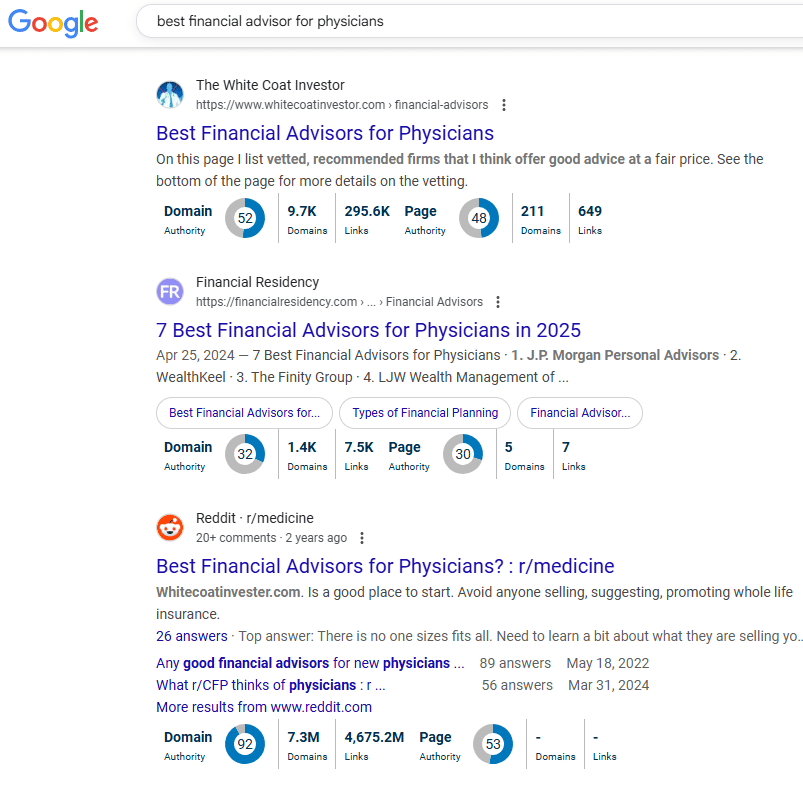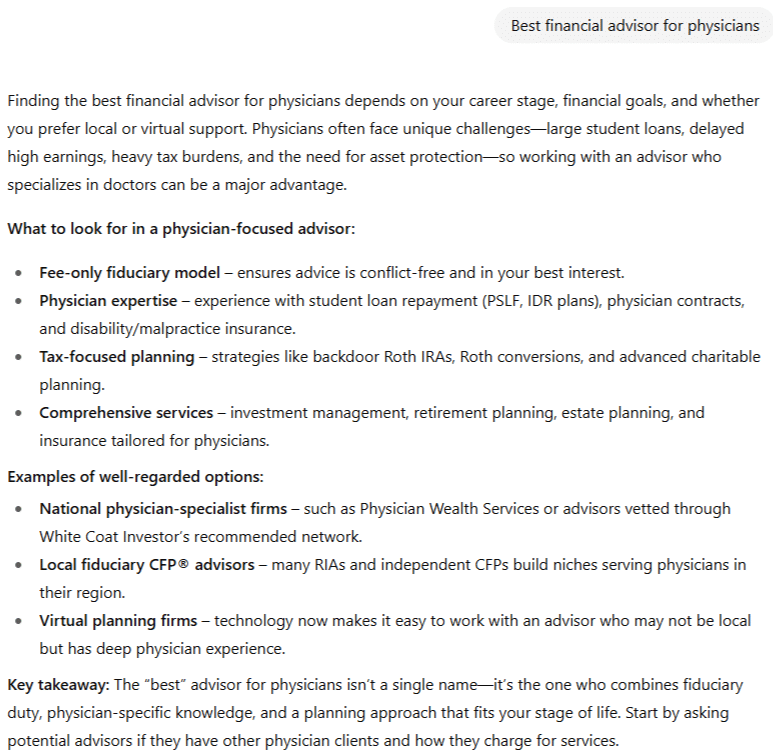SEO (Search Engine Optimization)
A strong online presence can open the door to more leads, better visibility, and long-term growth for financial advisors. But the search landscape is evolving quickly, and with it, new acronyms and strategies are emerging. Before we get into AEO and GEO, it’s worth grounding ourselves in SEO, the broader discipline they both fall under. SEO, or Search Engine Optimization, is the practice of making your website and content more visible in traditional search engines like Google and Bing.
For financial advisors, SEO has long been about making sure your firm shows up when someone types in a query like, “financial advisor near me” or “retirement planning services in [city].” Success here depends on a mix of technical setup, relevant content, and authority signals.
In practice, SEO includes:
- On-page optimization: Using clear titles, headings, and keywords that match what prospective clients are searching for
- Technical SEO: Ensuring your site loads quickly, is mobile-friendly, and is easy for search engines to crawl
- Local SEO: Building visibility in map results and local searches through tools like Google Business Profile
- Content creation: Publishing high-quality blogs, guides, or resources that answer client questions
- Backlinks and authority signals: Building trust through mentions and links from other credible sites
“SEO isn’t static – it’s evolving. The fundamentals are still the base, but search engines and AI platforms are now layering new signals into how they deliver information.”
In the past few months, financial advisors have been hearing a lot more about AEO (Answer Engine Optimization). Some are also hearing about GEO (Generative Engine Optimization). Within the wider SEO industry, other terms like LLMO (Large Language Model Optimization) are being floated as well.
Personally, I’d prefer to keep it all under the SEO umbrella; we optimize for search engines – whether that’s Google, Bing, YouTube, LinkedIn, or AI search platforms – but the financial industry seems to be favoring AEO. However, with AEO and GEO, it is not an either-or situation. If we choose to use one of those acronyms, we must also use the other. AEO is for a specific type of AI search result, as is GEO. Understanding both is the key to showing up across the evolving AI search landscape.
AEO (Answer Engine Optimization)
AEO stands for Answer Engine Optimization, and it applies when AI tools deliver short, direct answers to user questions. You’ll see this in platforms like ChatGPT, Perplexity, or Google’s AI Overviews, especially when someone is looking for a quick fact or definition.
For financial advisors, AEO is about structuring your content so these AI tools can easily include it when someone asks a question like, “Who is the best fiduciary advisor near me?” or “What is a Roth IRA?” AEO is often applied to queries where the user is seeking clarity or a simple takeaway rather than an in-depth guide.
What do we mean by “well-structured answers”? In practice, it’s content that:
- Addresses the question directly in plain language
- Uses clear formatting (like headings, bullet points, or short paragraphs) so AI tools can extract the answer easily
- Provides enough context to be trustworthy without overwhelming the reader
- Uses FAQ sections to present common questions and answers in a structured way
- Adds schema markup — a small piece of backend code that helps search engines and AI tools understand the context of your content
- Includes key takeaways or TL;DR summaries that package the bottom line in a way both people and AI can use
The goal isn’t to write more content, but to format your expertise in a way that makes it easy for AI systems to understand and present in answers. Instead of just optimizing for keywords, AEO is about creating authoritative, easy-to-digest answers that AI can quote, summarize, or recommend to users – which is different from GEO, where AI pulls together longer, narrative explanations.
For more information on AEO, read Advanced AEO for Financial Advisors.
GEO (Generative Engine Optimization)
GEO stands for Generative Engine Optimization. While AEO is about short, direct answers, GEO focuses on the longer, synthesized responses AI tools create by pulling from multiple sources. Instead of a single-sentence reply, GEO is what comes into play when an AI platform generates a full explanation or guide. You’ll see this in action on platforms like Perplexity, Google’s AI Overviews, or Bing Copilot, where answers are built from multiple references and presented as a narrative response.
For example, when someone searches, “What’s the best retirement strategy for physicians?” a GEO-driven result might produce several paragraphs combining tax planning, debt management, and retirement savings strategies into one coherent answer. The same would apply if someone searched, “What are the best retirement strategies for business owners in their 50s?” Rather than a one-line definition, the AI would generate a full response that pulls in tax strategies, investment considerations, and succession planning, stitched together from different websites.
For financial advisors, GEO is about positioning your firm to be one of those cited or referenced sources. That means:
- Publishing in-depth, authoritative content that goes beyond surface-level answers
- Using clear headings and subheadings that reflect the actual questions clients are asking, making it easier for AI tools to identify and pull relevant sections
- Developing topical authority by focusing on one audience and covering their needs comprehensively — for example, retirement planning for physicians could include estate planning, tax strategy, investment management, insurance, and succession planning, all tied to the realities of that profession
- Strengthening trust signals like brand mentions, backlinks, reviews, and consistent business information across platforms
In practice, this means pairing depth of content with credibility signals, so AI tools not only understand your expertise but also trust it enough to reference it in their answers. And when that happens, you increase your chances of showing up in front of prospective clients right when they’re actively researching their options.
So in reality, AEO and GEO extend the principles of SEO into AI-driven environments, helping your expertise show up whether the result is a one-line answer or a multi-paragraph explanation.
How Different Search Types Handle “Best Financial Advisor for [Niche]”
Let’s take a query niche financial advisors care about: “best financial advisor for [physicians].” How this shows up depends on the search platform:
On Google (Traditional + Local SEO):
- Google often shows the map pack first, highlighting firms with well-optimized Google Business Profiles and strong reviews.
- Organic results may include advisor websites, directories, or articles about working with physicians.
To compete here, you need local SEO, reviews, and authority content on your site.
On AI Short-Form Answers (AEO):
- An AI tool like ChatGPT or Google AI Overviews may return a direct answer, such as:
“The best financial advisors for physicians are those who understand unique challenges like student loan repayment, variable income, and tax planning for high earners.” - It may or may not mention specific firms.

A more detailed question is more likely to produce an actual recommendation.
To increase visibility, your content needs to be structured with FAQs, schema, and clear takeaways that AI systems can easily extract.
On AI Long-Form Responses (GEO):
- A GEO platform will generate a longer, synthesized answer that explains what to look for in an advisor for physicians.
- It may pull from multiple sites, weaving together advice and sometimes citing specific firms as examples.
To get cited, your firm’s content needs deep topical authority in that niche, in addition to trust signals like backlinks, brand mentions, and reviews.
What Financial Advisors Should Focus On
With so many acronyms flying around — SEO, AEO, GEO — it can feel like the ground is always shifting. But the reality is simpler. These are just different ways of achieving the same goal: helping the right people find you when they’re searching for financial guidance.
For advisors, that means focusing on a few practical steps:
1. Keep traditional SEO as the foundation
- Make sure your website is technically sound, loads quickly, and has a clear structure.
- Publish content that speaks directly to your audience’s questions and concerns.
- Stay consistent with local SEO: keep your Google Business Profile updated, gather reviews, and maintain accurate business information across the web.
2. Layer in AEO tactics
- Use FAQ sections, schema markup, and key takeaways to make your content easy for AI systems to extract.
- Write with clarity and structure – short paragraphs, clear headings, and direct answers.
3. Build toward GEO visibility
- Choose a niche and build topical authority by covering it in depth from multiple angles (retirement, tax planning, insurance, investments, estate planning — all through the lens of your chosen audience).
- Strengthen trust signals with backlinks, brand mentions, and client reviews.
Search is evolving fast. Google results, AI-powered short answers, and long-form generative responses are all now part of the mix. For financial advisors, this means showing up in more places than ever before and doing so in a way that builds trust with prospective clients.
At the core of it all is still content. The firms that win will be the ones creating clear, authoritative, niche-specific content that answers real client questions and is structured for both people and AI to understand.
Here’s my personal perspective: you’ll hear all of these acronyms, and they do serve a purpose — but I still see all of this as SEO. AI Search Optimization is part of the broader SEO picture, and terms like AEO and GEO are simply sub-categories within it.
In other words, we don’t need to reinvent the wheel; we just need to adapt how we approach it.
If you’re ready to connect with more of the right prospects, let’s talk. Schedule a free consultation to learn how we work with financial advisors and to see if we might be a good fit for your firm.
Brent is the Principal and founder of Advisor Rankings - a specialized SEO and AI search optimization agency dedicated to helping independent financial advisors strengthen authority, boost traffic, and attract high-quality leads online.
- Brent Carnduff






